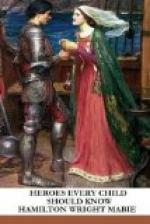When the day appointed had come, the Queen was led forth to a place without the walls of Carlisle, and there she was bound to the stake to be burnt to death. Loud were her ladies’ lamentations, and many a lord was found to weep at that grievous sight of a Queen brought so low; yet was there none who dared come forward as her champion, lest he should be suspected of treason. As for Gareth and Gaheris, they could not bear the sight and stood with their faces covered in their mantles. Then, just as the torch was to be applied to the faggots, there was a sound as of many horses galloping, and the next instant a band of knights rushed upon the astonished throng, their leader cutting down all who crossed his path until he had reached the Queen, whom he lifted to his saddle and bore from the press. Then all men knew that it was Sir Launcelot, come knightly to rescue the Queen, and in their hearts they rejoiced. So with little hindrance they rode away, Sir Launcelot and all his kin with the Queen in their midst, till they came to the castle of the Joyous Garde where they held the Queen in safety and all reverence.
At last Sir Launcelot desired of King Arthur assurance of liberty for the Queen, as also safe conduct for himself and his knights, that he might bring Dame Guenevere, with due honour, to the King at Carlisle; and thereto the King pledged his word.
So Launcelot set forth with the Queen, and behind them rode a hundred knights arrayed in green velvet, the housings of the horses of the same all studded with precious stones; thus they passed through the city of Carlisle, openly, in the sight of all, and there were many who rejoiced that the Queen was come again and Sir Launcelot with her, though they of Gawain’s party scowled upon him.
When they were come into the great hall where Arthur sat, with Sir Gawain and other great lords about him, Sir Launcelot led Guenevere to the throne and both knelt before the King; then, rising, Sir Launcelot lifted the Queen to her feet, and thus he spoke to King Arthur, boldly and well before the whole court: “My lord, Sir Arthur, I bring you here your Queen, than whom no truer nor nobler lady ever lived; and here stand I, Sir Launcelot du Lac, ready to do battle with any that dare gainsay it”; and with these words Sir Launcelot turned and looked upon the lords and knights present in their places, but none would challenge him in that cause, not even Sir Gawain, for he had ever affirmed that Dame Guenevere was a true and honourable lady.
Then Sir Launcelot spoke again; “Now, my Lord Arthur, in my own defence it behooves me to say that never in aught have I been false to you.”
“Peace,” said the King to Sir Launcelot: “We give you fifteen days in which to leave this kingdom.” Then Sir Launcelot sighed heavily and said: “Full well I see that nothing availeth me.” Then he went to the Queen where she sat, and said: “Madam, the time is come when I must leave this fair realm that I have loved. Think well of me, I pray you, and send for me if ever there be aught in which a true knight may serve lady.” Therewith he turned him about and, without greeting to any, passed through the hall, and with his faithful knights rode to the Joyous Garde, though ever thereafter, in memory of that sad day, he called it the Dolorous Garde.




